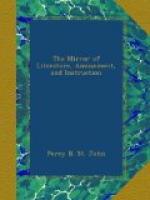no more—and of his paws, “very hands,
as you may say,” miserable matches to his miserable
feet. To know him as he is, you must go to Senegal;
or if that be too far off for a trip during the summer
vacation, to the Rock of Gebir, now called Gibraltar,
and see him at his gambols among the cliffs. Sailor
nor slater would have a chance with him there, standing
on his head on a ledge of six inches, five hundred
feet above the level of the sea, without ever so much
as once tumbling down; or hanging at the same height
from a bush by the tail, to dry, or air, or sun himself,
as if he were flower or fruit. There he is, a
monkey indeed; but you catch him young, clap a pair
of breeches on him, and an old red jacket, and oblige
him to dance a saraband on the stones of a street,
or perch upon the shoulder of Bruin, equally out of
his natural element, which is a cave among the woods.
Here he is but the ape of a monkey. Now if we
were to catch you young, good subscriber or contributor,
yourself, and put you into a cage to crack nuts and
pull ugly faces, although you might, from continued
practice, do both to perfection, at a shilling a-head
for grown-up ladies and gentlemen, and sixpence for
children and servants, and even at a lower rate after
the collection had been some weeks in town, would
you not think it exceedingly hard to be judged of in
that one of your predicaments, not only individually,
but nationally—that is, not only as Ben
Hoppus, your own name, but as John Bull, the name of
the people of which you are an incarcerated specimen?
You would keep incessantly crying out against this
with angry vociferation, as a most unwarrantable and
unjust Test and Corporation Act. And, no doubt,
were an Ourang-outang to see you in such a situation,
he would not only form a most mean opinion of you
as an individual, but go away with a most false impression
of the whole human race.
Blackwood’s Magazine.
* * * *
*
SONNET WRITTEN IN THE SPRING.
How heavenly o’er my frame steals the life-breath
Of beautiful Spring! who with her amorous gales
Kissing the violets, each stray sweet exhales
Of May-thorn, and the wild flower on the heath.
I love thee, virgin daughter of the year!
Yet, ah! not cups,—dyed like the dawn,
impart
Their elves’ dew-nectar to a fainting heart!—
Ye birds! whose liquid warblings far and near
Make music to the green turf-board of swains;
To me, your light lays tell of April joy,—
Of pleasures—idle, as a long-loved toy;
And while my heart in unison complains,
Tears like of balm-tree flow in trickling wave,
And white forms strew with flowers a maid’s
untimely grave!
New Monthly Mag.
* * * *
*
THE KING OF ARRAGON’S LAMENT FOR HIS BROTHER.[1]
“If I could see him, it were well with me!”
Coleridge’s Wallenstein.
There were lights and sounds of revelling in the vanquished
city’s halls,
As by night the feast of victory was held within its
walls;
And the conquerors filled the wine-cup high, after
years of bright blood shed:
But their Lord, the King of Arragon, ’midst
the triumph, wailed the dead.




